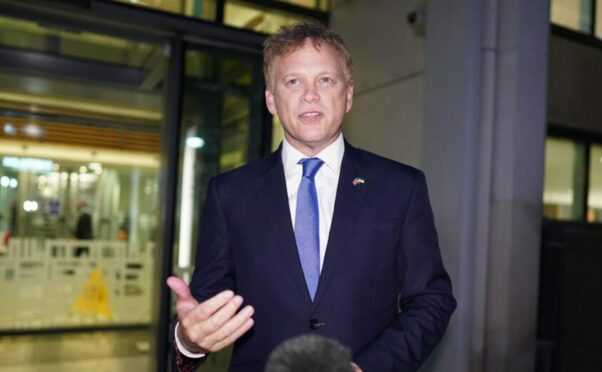From energy rationing to onshore wind, newly-appointed business and energy secretary Grant Shapps has voiced opinions on a range of topics in the sector.
As Shapps starts as secretary of state for business energy and industrial strategy (BEIS) in prime minister Rishi Sunak’s cabinet, we looked at the new energy secretary’s voting habits on issues impacting the industry.
On his first visit to the BEIS department’s offices, Shapps said to staff: “The department clearly has a huge agenda, in particular on energy prices. Let’s get to work.”
He then took to Twitter to write: “As business and energy secretary I look forward to leading the department to fix our energy market and deliver growth and prosperity for the UK.”
Great to meet @beisgovuk staff this evening.
As Business and Energy Secretary I look forward to leading the department to *fix* our energy market and deliver growth and prosperity for the UK. https://t.co/4pKyvahGtF
— Rt Hon Grant Shapps MP (@grantshapps) October 25, 2022
Shapps is the fifth person to hold the job since the 2019 general election, taking over from Jacob Rees-Mogg who recently submitted his resignation.
Soon after his appointment, the British Chambers of Commerce (BCC) congratulated Shapps, saying: “The BCC would like to welcome Grant Shapps to his new role as secretary of state for business, energy and industrial strategy.
“We look forward to working with him on supporting UK businesses, including tackling the challenges around energy and supply costs and promoting growth.”
The BCC would like to welcome @grantshapps to his new role as Secretary of State for Business, Energy & Industrial Strategy. We look forward to working with him on supporting UK businesses, including tackling the challenges around energy and supply costs, and promoting growth. https://t.co/BQhH09khFJ
— BCC (@britishchambers) October 26, 2022
Onshore wind
Earlier this year, Mr Shapps openly criticised the “vast increase” in onshore wind farms, describing turbines as “eyesores” on a Sky News programme.
Citing issues of potential damage to the environment, the new secretary of state seemingly shares opinions with his Conservative colleague Andrew Bowie, MP for West Aberdeenshire and Kincardine, who recently opposed the proposed Hill of Fare wind farm in Aberdeenshire.
Shapps voted against supporting the reduction of the UK’s net targeted greenhouse gas emissions to zero by 2050 – the initial core mission of the Advanced Research and Invention Agency in June last year – according to TheyWorkForYou.com.
His views on onshore wind have been criticised on Twitter since taking the energy job, with environmental scientist and Our One Home chief executive, Angela Terry, writing: “The chap in charge of solving the energy crisis this week is the same chap who pushed for a ban on onshore wind farms despite them being nine times cheaper than gas because he didn’t like the view from his private plane.
“Hoping for a renewable energy revolution but not expecting much.”
The chap in charge of solving the energy crisis this week is the same chap who pushed for a ban on onshore wind farms despite them being 9X cheaper than gas because he didn't like the view from his private plane. Hoping for a #renewableenergy revolution but not expecting much ☹️ https://t.co/2QVGgjSneB
— Angela Terry (@ANGETERRY) October 25, 2022
No need for energy rationing
In April this year, Shapps said energy rationing would not be necessary for the UK to the extent countries such as Germany have proposed.
Explaining that Russia’s invasion of Ukraine and the subsequent global focus on energy security had been a “massive wake-up call,” he said: “We don’t see rationing being part of our approach to this and nor should it be.”
The new energy secretary proposed at the time that the UK scale up offshore wind production, showing he is not completely against wind energy despite opposing onshore farms.
He said: “By and large, I think it’s better to build significant wind power offshore.”
Fracking
During her short-lived premiership of 44 days, Liz Truss sought to overturn the moratorium on fracking to boost domestic gas supplies, a controversial decision.
In a vote last week, Shapps voted no to a ban on fracking for the Shale Gas Bill.
However, in the past Shapps has generally opposed fracking in the UK, having consistently voted for greater restrictions on hydraulic fracturing throughout 2015.
As he takes to office, the think tank Green Alliance has urged Shapps to ban fracking, describing the practice as: “Fracking is a red herring.”
Nuclear Energy
The new secretary of state is also on record as being a supporter of nuclear energy production.
In January this year, Mr Shapps voted in favour of laws enabling the government to direct funds from electricity consumers via electricity suppliers, to help pay for and encourage private investment in new nuclear power stations.
The vote saw 458 members of parliament voting in favour, massively outweighing the 52 who opposed.
Shapps voted for the same policy the previous year as well.
In the Sky News interview Mr Shapps said the government “will be looking for a greater mix to produce our energy,” adding: “You might expect to see more nuclear reactors.”

Conversation